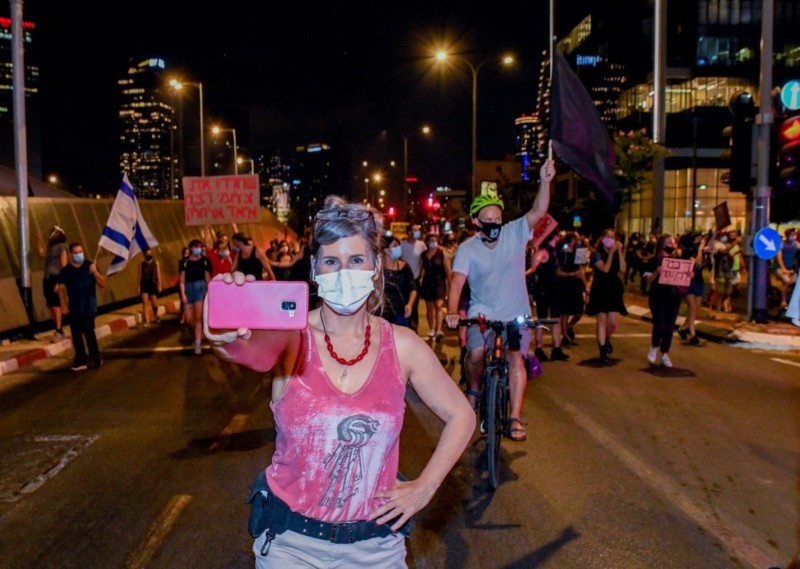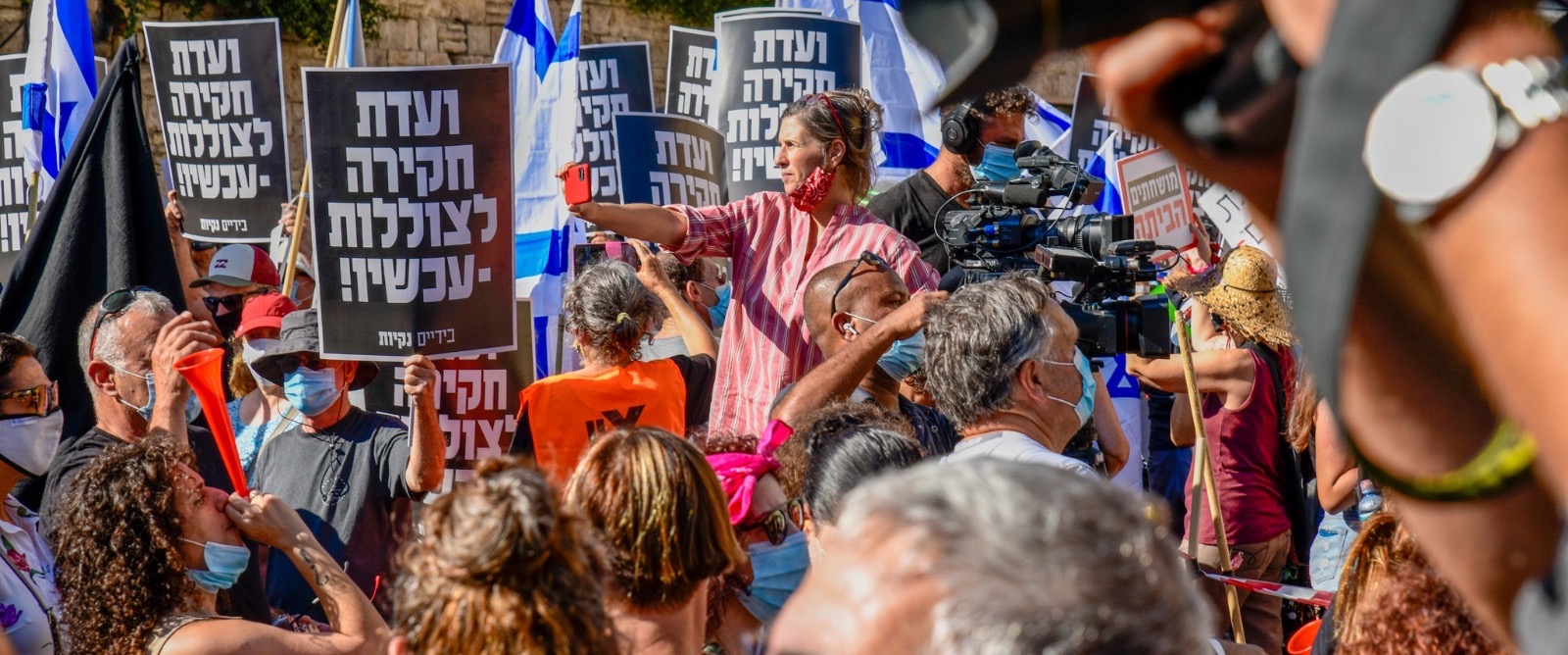Sign up for The Media Today, CJR’s daily newsletter.
This summer, tens of thousands of Israelis have taken to the streets to demand that Benjamin Netanyahu resign. Netanyahu, who has served as prime minister for eleven years, is on trial in three separate cases, involving breach of trust, bribery, and fraud; two of the cases involve meddling in the media for favorable coverage. Last year, his grip on power—which had held firm since taking office—loosened considerably. And just as his leadership looked more vulnerable than ever, the coronavirus arrived in Israel. As it spread, people outraged by Netanyahu’s failure to protect the public health—even as he enacted harsh and invasive monitoring measures—turned out for demonstrations. They’re now being held all over the country; crowds gather in front of Netanyahu’s residence in West Jerusalem almost daily.
Or-ly Barlev, a forty-eight-year-old independent journalist and activist, broadcasts from the protests on Facebook Live. Recognized for her red lace-up boots and her investigative work on Israel’s gas monopoly, Barlev attends every demonstration, filming for hours with her smartphone while narrating the scene for viewers, many of whom cheer her on and tell her that it’s thanks to her broadcasts that they decided to show up. She interviews protesters, artists, and politicians; she also demands answers from officers about police brutality and efforts to block the demonstrations. Her videos have reached hundreds of thousands, peaking thus far at 300,000 viewers; the size of her audience competes with that of Israeli television’s prime-time news.
Recently, I called Barlev at her home, in a town in central Israel. “I’m not interested in being branded a ‘protest leader, protest princess, protest queen, protest icon’—this protest has no leaders,” she wanted CJR readers to know. “While I identify with the message of the protest—I’m not objective, I have an agenda—I’m an independent journalist who has no part in organizing or leading this protest.” We spoke about her country’s press, what the pandemic has revealed about Israeli-Palestinian relations, and a post-Netanyahu future. This interview has been translated from Hebrew and edited for clarity and length.
What is your background in journalism?
I worked in mainstream media; I know that world. My first major position was as a reporter for Kol Yisrael [Israel’s national public radio], between 1997 and 2000. Since the 2011 social justice protests, I started doing citizen journalism on a voluntary basis. I funded the effort from my own savings.
I have been doing a weekly news broadcast every weekend for the last two years. It’s called “News Flash from the Only Democracy in the Middle East.” I don’t cover everything. I’m a one-woman show, so I do what interests me: democracy, government corruption, capital-government relations, economy—as far as tycoons and monopolies, and the gas industry.
I started livestreaming the protests a month ago, so I have integrated my news flash into them. Facebook Live is my studio. I don’t have a teleprompter. I prepare notes in my head and I just talk. Live—the most live you can get. I don’t have an assistant or a producer. Nobody holds up cards. I step aside for a few minutes from the protest and give a speech to the nation. For example, that Netanyahu has been leading a campaign to demonize the protesters. I outline why he is doing this, what tools he is using to do it, and what the media’s role should be. I include a lot of media criticism.
In recent years, my independent journalism is increasingly funded by the public. I started a crowdfunding campaign in January 2019, and since then I’ve been on the map as a publicly funded independent journalist. The public is validating my work.
I heard you don’t have a government press card. Is that right?
Lately the police have been asking me to show one. I haven’t needed one until now. My application is currently stuck in processing. It’s just a certificate that eases access to certain government press conferences. As I have explained to the police recently, the government doesn’t get to decide who is or isn’t a journalist. A person is a journalist based on their actions, if they have readers, viewers, listeners.

Courtesy: Benco Photography
What is happening in the mainstream Israeli media?
People tune in to my broadcasts largely due to the failure of the media to tell the real story about what is happening here. Netanyahu controls many media outlets, to different degrees. Netanyahu understood a long time ago that the key to power is controlling the public consciousness. And it works for him. He was one of the first to take advantage of digital media as a tool to communicate directly to the people.
He has built his public image. He has very good connections with editors and manages to get his people into the studios. In the past two years, he has planted people in every panel, every studio; there is always someone speaking on behalf of Bibi. Not representatives of the right. Not right-wing intellectuals. Mouthpieces. Propagandists. And he feeds the media spins, which some journalists eat up. Journalists don’t push back. There’s a lot of capitulation. It’s a feeble media. Doesn’t ask tough questions, doesn’t boycott press conferences when Netanyahu refuses to take questions. So you have a weak media up against false narratives.
It looks like these mass protests are one of the few times in Israeli history that both right-wing and left-wing Israelis are protesting in the same place with the same message. How do you see it?
The determination of the protesters is amazing. There are many young people who have nothing to lose. They feel their future has been taken. They have no income. The situation is really bad, and it’s only going to get worse. The protests aren’t about right and left; that division is a lie. The political process [with the Palestinians] isn’t real, there’s no peace plan right now. The annexation plan is a spin. Netanyahu uses his power to escape trial and prison. That’s it. That’s his primary motive. And that veil has now been lifted with the pandemic.
Do you think the recent announcement of a US-brokered deal between the UAE and Israel to normalize ties in exchange for a temporary shelving of annexation has any effect on the protests, and how do you see the deal itself?
It has no bearing on the protest, which is about the threats to democracy, corruption, and the economic collapse. The criminal defendant [Netanyahu] does not have the public or moral mandate to take on such fateful decisions. Democracy, integrity, values, and managing a country by centering on its people—not its leader—are much more crucial to Israel than normalizing relations with the UAE.
The media adopted government talking points when covering Saturday night’s protest. The new message: “The protests are dwindling.” It’s a spin that the media just ate up. It’s nonsense. [According to organizers who distributed bracelets, 20,000 came out for demonstrations on the Saturday night after the deal was announced.] This protest has been going on for eight consecutive weeks, several times a week, all over the country, by diverse Israelis protesting in a variety of ways.
You interview a lot of people at the protests. Why do you think they trust you? And how do you see your work affecting the media landscape?
It’s already changing the media. I see more outlets broadcasting from there. At first they were stationed outside the protest. They saw I was inside, so they started to come inside as well. As far as my journalistic work, all I’m doing is talking to people. I listen to them. I am eager to make their voices heard. I see it as an honor to be their megaphone. Part of the sanctity of the profession. That’s my job. I say what I think, but I show everything. I am loyal to the truth. I am loyal to facts.
It’s citizen journalism, and it exists in Israel, but I’ve never seen one person reach the level of attention that you have. Part of your appeal is that you don’t seem to identify as either right or left.
I insist on it, despite the fact that they try to pigeonhole me as a leftist. I have my own personal, private views, but I don’t share them. I made a conscious choice to only focus on socioeconomic issues, on democracy. It is a pragmatic decision. I don’t talk about politics because it immediately bars one side from listening. And honestly, everyone annoys me, from all sides.
Will you say whether you oppose Israeli occupation of the West Bank and the Gaza Strip, which Netanyahu has advanced?
I don’t talk about the occupation.
And that’s not political?
I didn’t say whether it is or isn’t, but I don’t cover those topics. The occupation is one of the most divisive issues in Israel. To reach a solution, Israeli society has to first rebuild internal dialogue. This can take place within a socioeconomic discourse. Netanyahu plays with right and left—he activates that dialogue, and it’s destructive to both sides. To all sides.
What happens the day after Netanyahu?
A lot of work. A lot. Healing, rehabilitation. But it’s already started. One of Bibi’s tools is to divide and fracture, and people are uniting. The contra has started. The antidote started working.
RECENTLY: The context for the crisis: A Q&A with Penny Abernathy
Has America ever needed a media defender more than now? Help us by joining CJR today.



